Key takeaways:
- Hospital ministry acts as a bridge between spiritual care and healthcare, emphasizing the importance of listening and understanding diverse spiritual needs.
- Spiritual care significantly impacts emotional well-being and resilience for both patients and healthcare providers, enhancing the overall healing process.
- Building trust with patients through genuine openness and adaptability fosters meaningful connections and improves spiritual support.
- Personalized spiritual care involves engaging with patients’ beliefs, creating tailored rituals, and being present to their unique experiences.
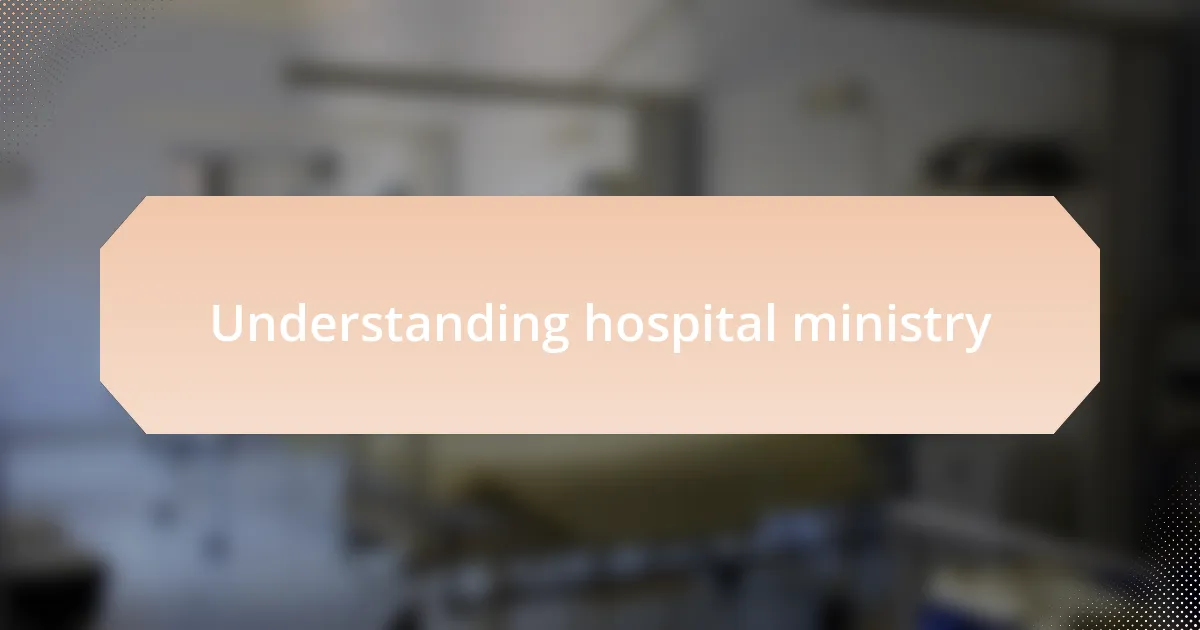
Understanding hospital ministry
Hospital ministry serves as a vital bridge between spiritual care and healthcare, recognizing that healing goes beyond physical treatment. I remember a particular instance when I sat with a patient who had just received heartbreaking news about their diagnosis. It became clear to me that my role was not just to offer prayers but to listen deeply and provide a comforting presence during such a vulnerable moment.
Engaging with patients means acknowledging their diverse spiritual needs, which can vary significantly based on their backgrounds and beliefs. For example, during my time in the hospital, I met a family from a different faith tradition seeking solace in their rituals. It struck me then how vital it is to be adaptable and sensitive to each person’s unique spiritual journey. Isn’t it powerful to think that small gestures of understanding can profoundly impact someone’s emotional well-being?
Moreover, the role of a hospital minister is not solely about providing support but also about fostering connections within the healthcare team. I often found that collaborating with medical personnel could enhance patient care. When we worked together, sharing insights about the spiritual values that mattered to families, it created a holistic approach to healing that truly respected each individual’s humanity. Wouldn’t you agree that recognizing the spiritual dimension of healthcare enriches the entire healing process?

Importance of spiritual care
Spiritual care is essential because it addresses the emotional and existential questions that often arise in times of crisis. I remember visiting a patient who was grappling with fear and uncertainty about their future. As we spoke, I realized that simply being there to acknowledge their worries provided an immense sense of relief—showing how spiritual care can bring a measure of peace amid chaos.
The impact of spiritual care on a patient’s overall well-being cannot be overstated. In working with families, I’ve seen how their faith and spiritual practices can become a source of strength, aiding in their coping mechanisms. Doesn’t it make sense that when patients feel supported holistically, they tend to recover with a more positive outlook?
Furthermore, integrating spiritual care into the healthcare setting promotes resilience—not just for patients but for the healthcare providers as well. I once had a conversation with a nurse who shared how her encounters with patients’ beliefs helped her find purpose in her rigorous routine. It made me reflect on how spiritual connections can nurture both the giver and the receiver of care. Isn’t it incredible to think that these interactions can inspire deeper compassion in those who care for others?
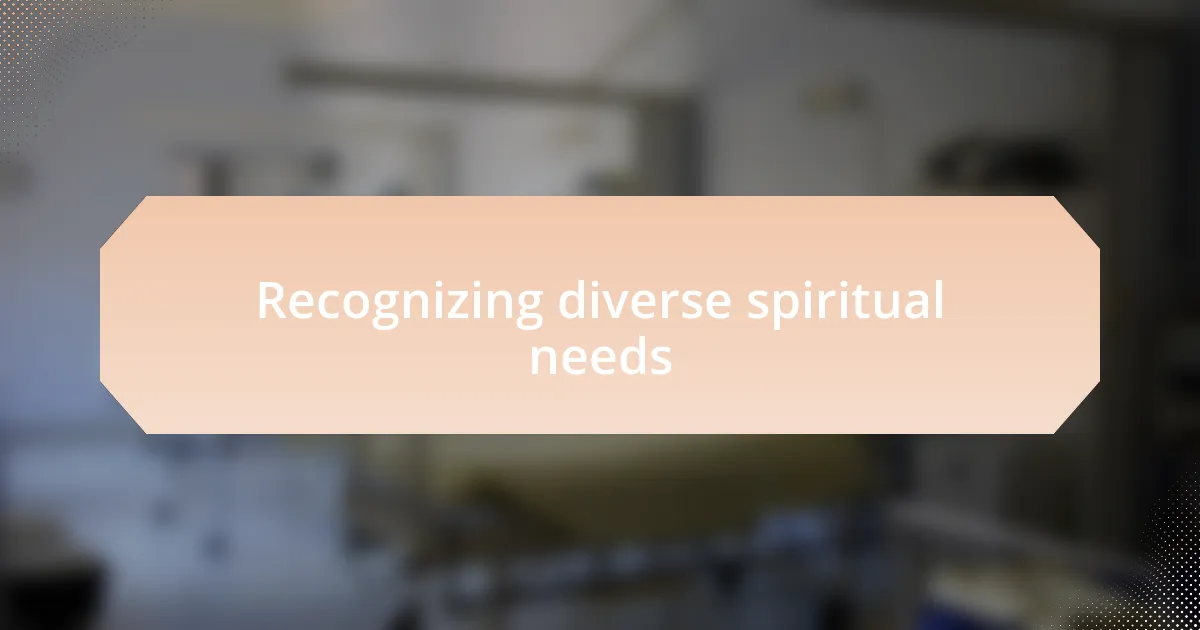
Recognizing diverse spiritual needs
Recognizing diverse spiritual needs begins with attentive listening. Early in my ministry, I encountered a patient whose cultural background shaped their worldview significantly. As I tuned in to their stories, I sensed how pivotal their traditional beliefs were even in a hospital setting. Have you ever noticed how simply understanding someone’s background can open the door to deeper connections?
Different spiritual practices can often reflect individual needs in times of distress. For example, I once assisted a family who wanted to incorporate prayer rituals into their loved one’s care plan. This experience taught me that recognizing these unique practices can profoundly impact a patient’s mindset and overall experience. It’s fascinating how personalized support, even in simple gestures, can cultivate a healing atmosphere.
Moreover, being aware of spiritual diversity means acknowledging that every individual’s journey is distinct. I vividly recall a conversation with a patient who found solace in art as a form of spiritual expression, while another sought comfort through meditation. This diversity reminds me that spiritual care is not one-size-fits-all; rather, it thrives on understanding and embracing each person’s path. Isn’t it remarkable how a little curiosity about someone’s journey can lead to transformative care?
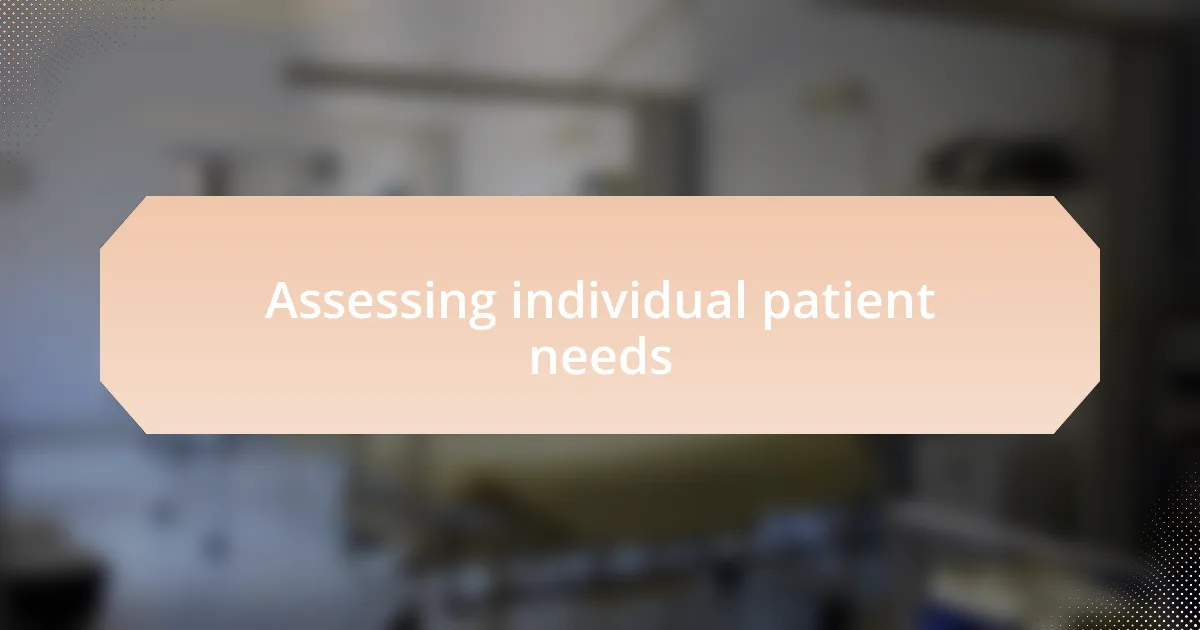
Assessing individual patient needs
Assessing individual patient needs starts with creating an atmosphere of trust. I remember a time when I sat down with a patient who seemed withdrawn. Instead of jumping right into questions, I simply asked about their day. This small gesture invited them to share their feelings, allowing me to understand their spiritual concerns more deeply. Isn’t it amazing how a simple question can reveal so much?
Once the lines of communication are open, I delve into the specifics of their spiritual practices and beliefs. In one instance, I met a patient who found strength in their faith through specific scripture readings. By acknowledging their request for these readings during their treatment, I witnessed a shift in their overall well-being. It cemented for me that personalized attention to spiritual needs can not only uplift the patient but also guide the care provided.
I often find that using a holistic approach yields the best results when assessing needs. For example, I once worked with a family who desired to explore nature as a form of spiritual renewal while their loved one was hospitalized. Bringing elements of nature—like plants or imagery—into the patient’s room made a noticeable difference in their mood. This teaches me that addressing spiritual needs might not always fit into traditional frameworks; sometimes, it’s about stretching beyond the conventional boundaries. How can we better incorporate such diverse practices into our care?
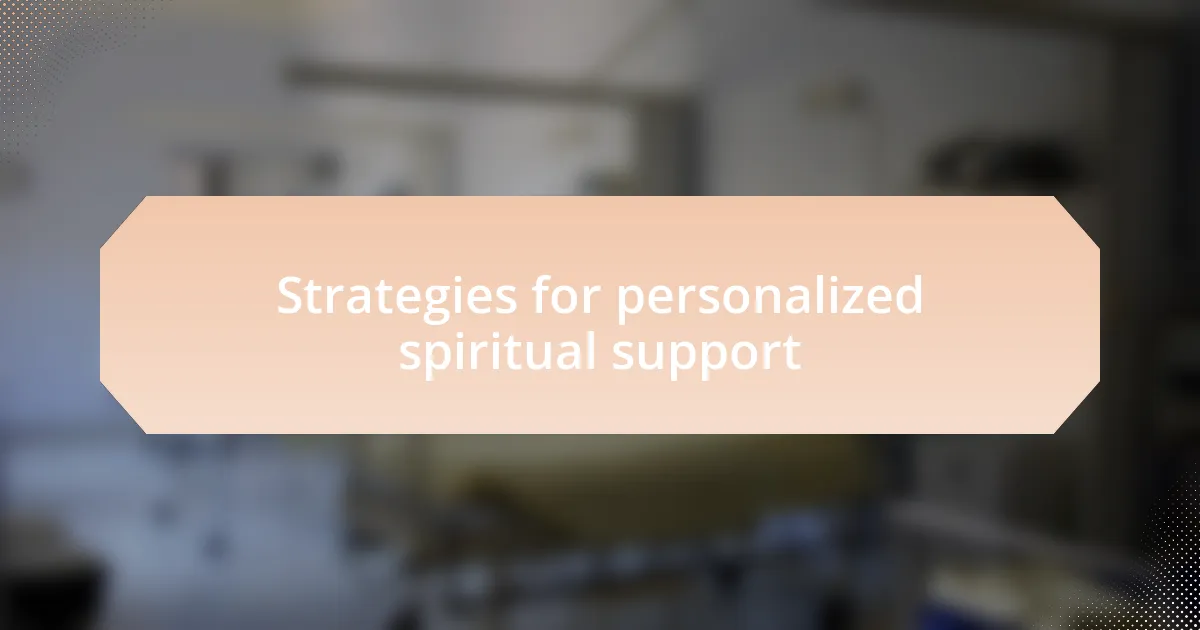
Strategies for personalized spiritual support
One effective strategy for personalized spiritual support is to actively engage patients in conversations about their beliefs and values. There was a time when I sat with a patient who cherished music as a pathway to spirituality. By encouraging them to play their favorite hymns on a small speaker, I witnessed an immediate change in their demeanor. Music has a unique power to reach the soul, doesn’t it? It’s crucial to tap into such personal preferences to foster a supportive environment.
Another strategy involves creating ritual spaces tailored to individual preferences. I recall a family who requested a small altar in their loved one’s room to place cherished mementos. This simple act transformed the space into a haven of peace and connection. Rituals, however informal, can anchor patients and families during turbulent times. How often do we underestimate the power of these small, yet significant, gestures?
Moreover, low-key one-on-one check-ins can be a game-changer. I remember visiting a patient who initially declined to discuss their spiritual needs. After a few weeks, they opened up during a quiet moment, sharing that they longed for meditation but felt too overwhelmed. By offering guided meditation sessions in a relaxed atmosphere, I helped them rediscover a sense of calm. Isn’t it fascinating how giving space for silence can allow profound insights to emerge? Each person’s journey is unique, and tailoring spiritual support can illuminate paths to healing.

Building trust with patients
Building trust with patients requires a genuine and open approach. I remember a time when a patient seemed withdrawn, avoiding eye contact and reluctant to discuss anything beyond their medical condition. I took a moment to simply listen and share a bit about myself, expressing vulnerability. That small act of openness encouraged them to gradually share their fears and hopes, helping us build a rapport based on mutual trust.
Understanding a patient’s background is also essential. I once worked with a woman from a different cultural tradition who seemed hesitant to accept spiritual support. By asking about her customs and taking the time to learn about her beliefs, I found common ground. Trust flourishes when patients see that their experiences are valued and respected, don’t you think? Making that effort goes a long way in establishing a solid foundation for ongoing support.
Lastly, consistency in my presence has proven pivotal in nurturing trust. I recall a young man who initially resisted my visits, perhaps feeling vulnerable in his situation. However, after several brief but meaningful interactions, he began to smile warmly upon seeing me. It’s a gentle reminder that patience, along with a commitment to being there for patients, can transform uncertainty into a trusting relationship over time. How often do we recognize that trust is built not just with words, but through consistent, caring actions?
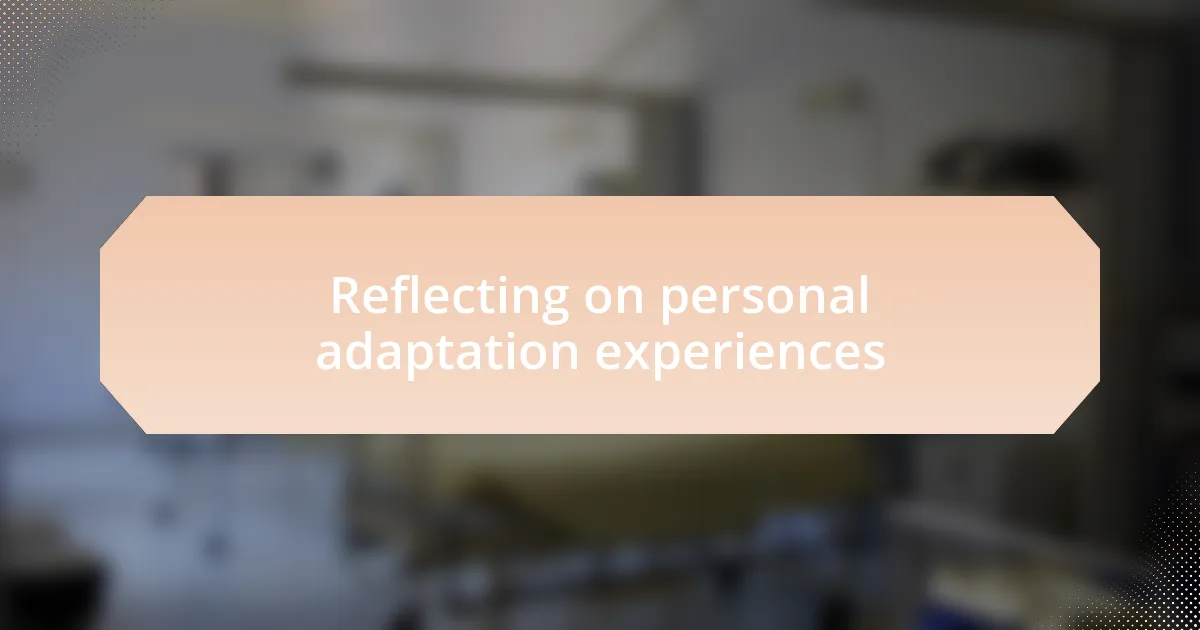
Reflecting on personal adaptation experiences
Reflecting on my personal adaptation experiences in hospital ministry often leads me to recognize the importance of flexibility in approach. I once met a patient who practiced a unique form of meditation that seemed unfamiliar to me. Rather than make assumptions, I took the time to learn about her practice and even participated for a brief moment by closing my eyes and following her lead. This not only deepened our connection but also highlighted how personal adaptation can enhance the spiritual care provided.
Another experience comes to mind when I worked with a family grappling with grief. They were from a faith tradition that emphasizes community rituals, and I realized my role was not to impose my beliefs but to create a space where their rituals could be honored. I coordinated with their spiritual leader, which allowed me to be a supportive ally in their healing journey. Have you ever found that adapting to another’s traditions can enrich your own understanding of spirituality? This interaction truly opened my eyes to the diverse ways people find comfort, reminding me that it’s the willingness to adapt that fosters deeper connections.
I also vividly recall a moment with an elderly gentleman who found solace in storytelling. As I listened to his stories, I felt the weight of his experiences and how they shaped his spiritual journey. I realized just how crucial it was for me to adapt my listening skills to give him the space he needed to remember and feel valued. Can you recall a time when being present for someone allowed their voice to shine? These experiences demonstrate how adapting to the diverse spiritual needs of patients doesn’t merely involve altering tactics; it’s about deepening empathy and understanding in meaningful ways.